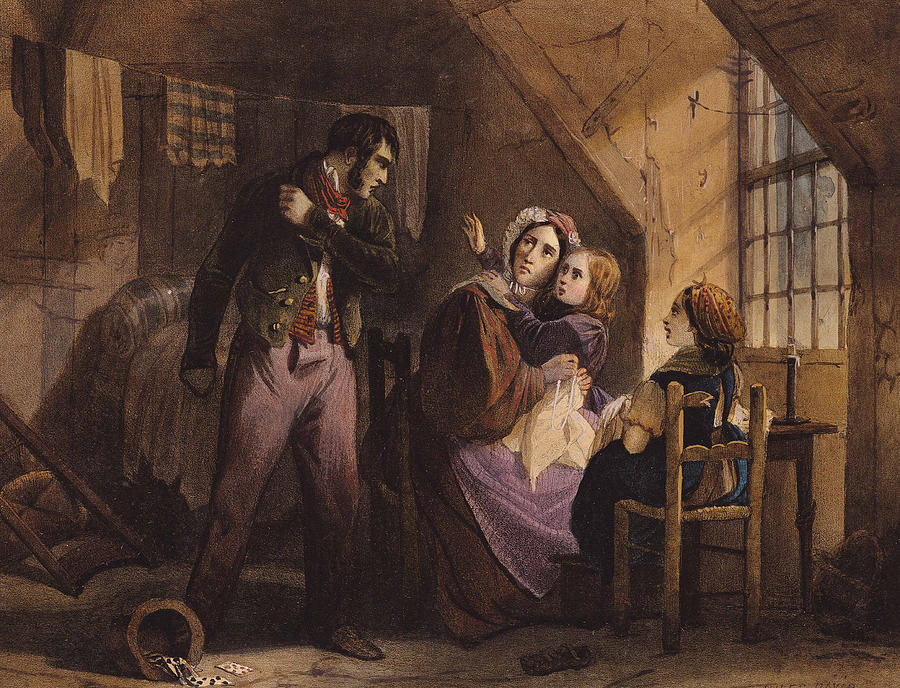Summary: Attitudes toward domestic violence have changed over time and across cultures. Practices that were once considered normal and even humorous are now condemned as abhorrent and criminal. This moral progress is a result of growing prosperity.
Music can act as a window into humanity’s far more brutal past. Consider “The Cooper of Fife,” or “Wee Cooper o’ Fife,” a traditional Scottish folk song that inspired a country dance and similar English and American folk ballads. The contrast between the lyrics (which tell a tale of domestic violence) and the song’s cheerful tune is jarring to a modern listener. (Listen here). As with most old folk songs, there are many variations of the lyrics, but this is a typical version:
There was a wee cooper [barrel maker] who lived in Fife,
Knickety, knackety, no no no.
And he has gotten a gentle [noble-born] wife [. . . .]
She would not card [untangle wool] and she would not spin,
For the shaming of her gentle [noble] kin.
So the cooper went to his wool shack
And laid a sheepskin on his wife’s back.
“I would not thrash you for your gentle kin,
Knickety, knackety, no no no.
But I will thrash my own sheepskin!”
The lyrics go on to relate how as a result of the beating, the highborn wife resigns herself to doing housework. The message of the song is clear: the singer believes that the Cooper of Fife is fully justified in thrashing his wife, and the audience is meant to sympathize with the husband and howl with laughter at the uppity wife being beaten into submission. The song ends by advising, “So ye who has gotten a gentle wife [. . .] Just send for the wee cooper of Fife!”
While “The Cooper of Fife” is merely a song, it captured beliefs that affected actual women’s lives. In 1939, a Chicago woman named Mary Kuhar petitioned for divorce on the grounds that her husband often slapped her. The presiding judge, Philip J. Finnegan, opined that wife slapping was perfectly legal as long as the wife survived, and he suggested that such violence was good for marital harmony. A newspaper reported on the ruling this way:
“Under the law”, said Judge Finnegan, “cruelty must consist of violence great enough to endanger life. A slap does not endanger life. A man may slap his wife as hard as he wants to if he doesn’t kill her. If more wives were slapped there would be fewer divorces.”
Such attitudes remained common for decades. The late Scottish actor Sean Connery, best known for portraying James Bond, spoke for many of his contemporaries when he told Playboy in 1965, “I don’t think there is anything particularly wrong about hitting a woman.” He added that he’d be willing to hit a woman under various conditions, such as “if a woman is a b****, or hysterical” (please pardon the language, as the choice of words was his, not mine). The idea that slapping a frantic woman was often necessary to calm her down was a well-known trope, lampooned in a memorable scene in the 1980 comedy film Airplane.
In 1968, nearly 17 percent of men in the United States approved of a husband slapping his wife. By 1994, that figure had mercifully fallen, but was still too high – just over 6 percent of U.S. men.
The fable of the noble-born Cooper of Fife’s wife notwithstanding, much research suggests that higher socioeconomic status tends to decrease women’s risk of suffering “intimate partner violence,” the term researchers use for a woman’s husband or romantic partner beating her. It is perhaps unsurprising that as Europe and the United States have grown wealthier and many of their people—including women—have escaped poverty, the social status, bargaining power in society, and general treatment of women have improved alongside their material conditions.
In many poorer countries, acceptance of wife beating remains far higher to this day than in rich countries. The latest wave of the World Values Survey (2017–2022) found that even in wealthy and highly developed Germany, nearly 4 percent of respondents answered that a husband beating his wife is justified at times, while in impoverished Tajikistan, a dismayingly large majority—over 77 percent—voiced approval of domestic violence. In fact, a majority of respondents in Iraq, Kenya, Malaysia, Mongolia, Morocco, the Philippines, and Vietnam also indicated that a husband is sometimes justified in beating his wife. Note that each of those countries is relatively poor.
Rwanda, also poor, was not surveyed in the latest wave of World Values Survey data, but in 2015 a shocking, near-unanimous 96 percent of Rwandans answered that wife beating is occasionally justified.
Songs like “The Cooper of Fife” can help us understand the extent of moral progress, but it is important to remember that progress is often uneven, and in many places the abhorrent attitude at the heart of the song is still tragically widespread.





